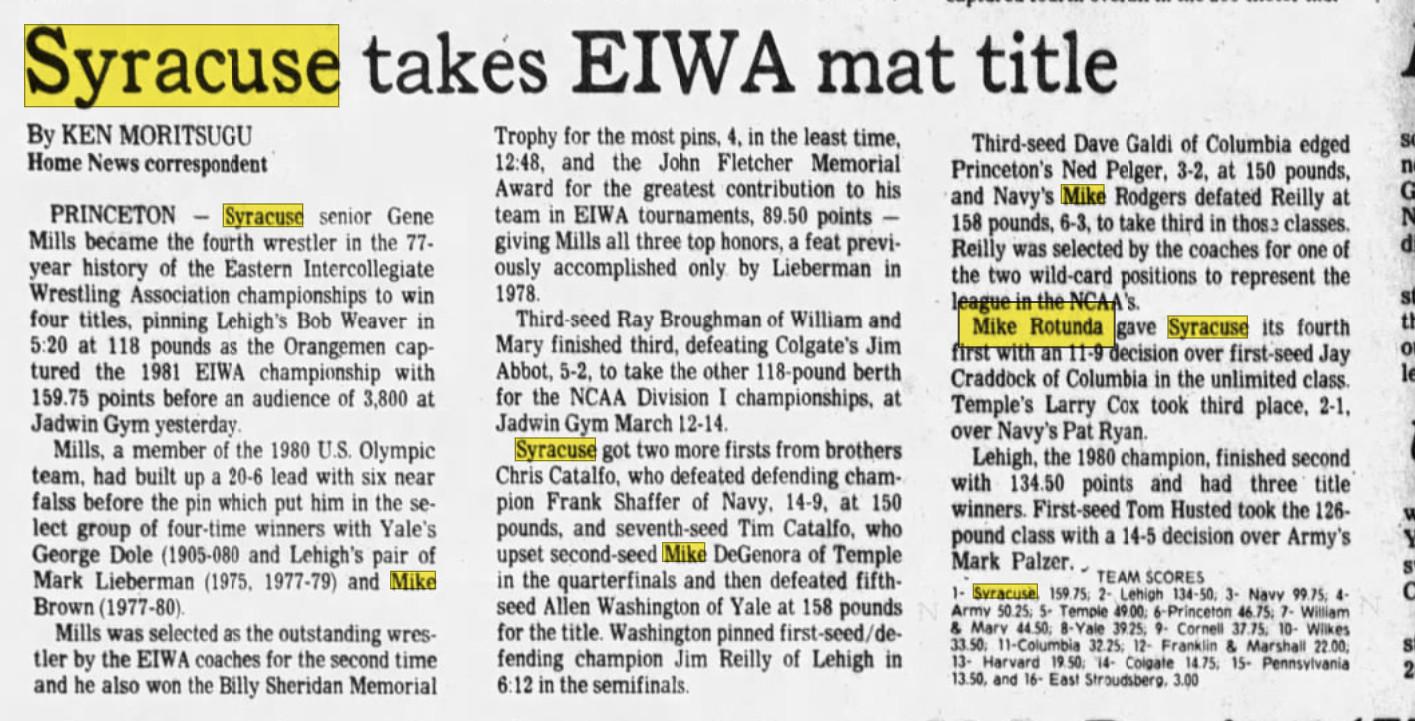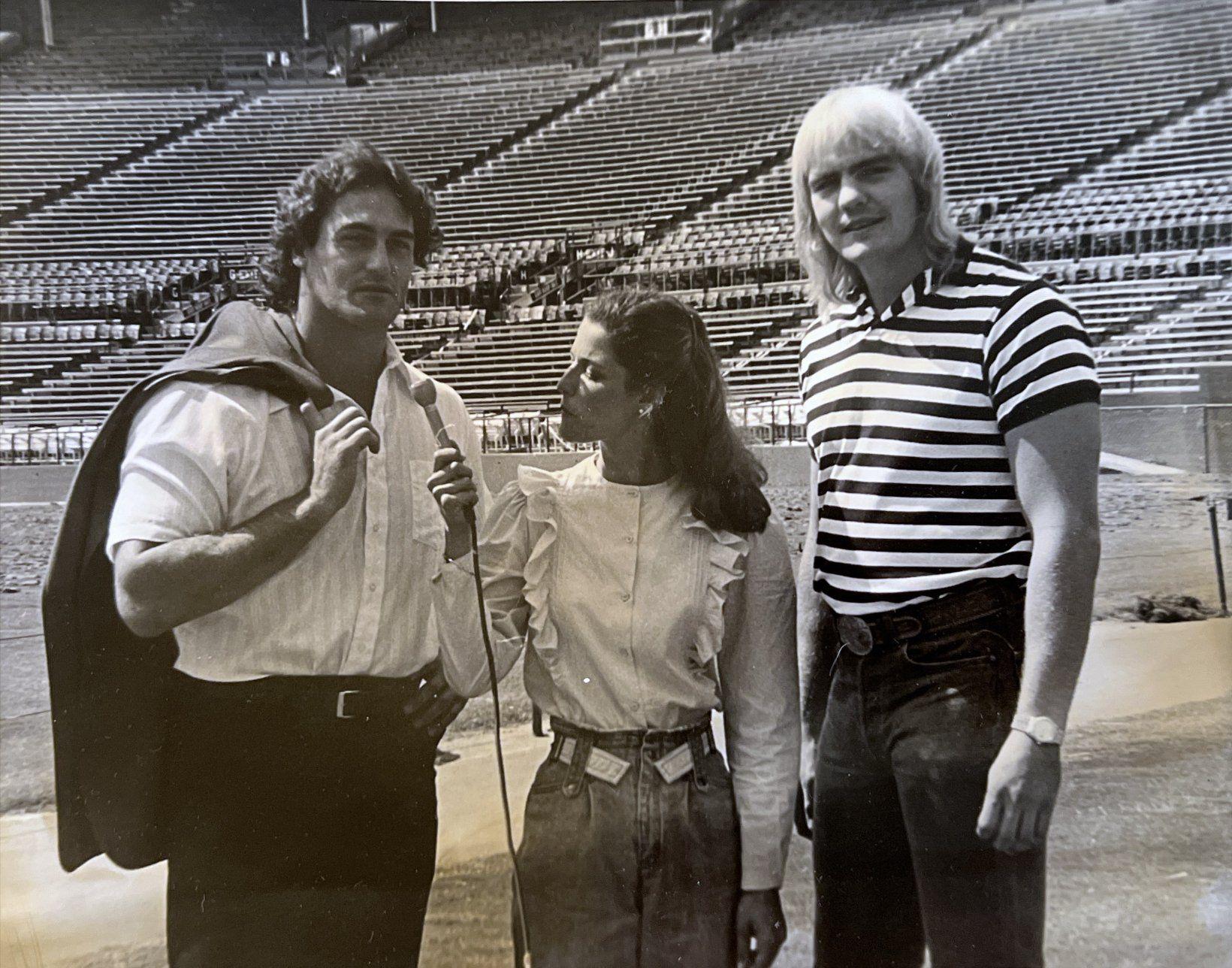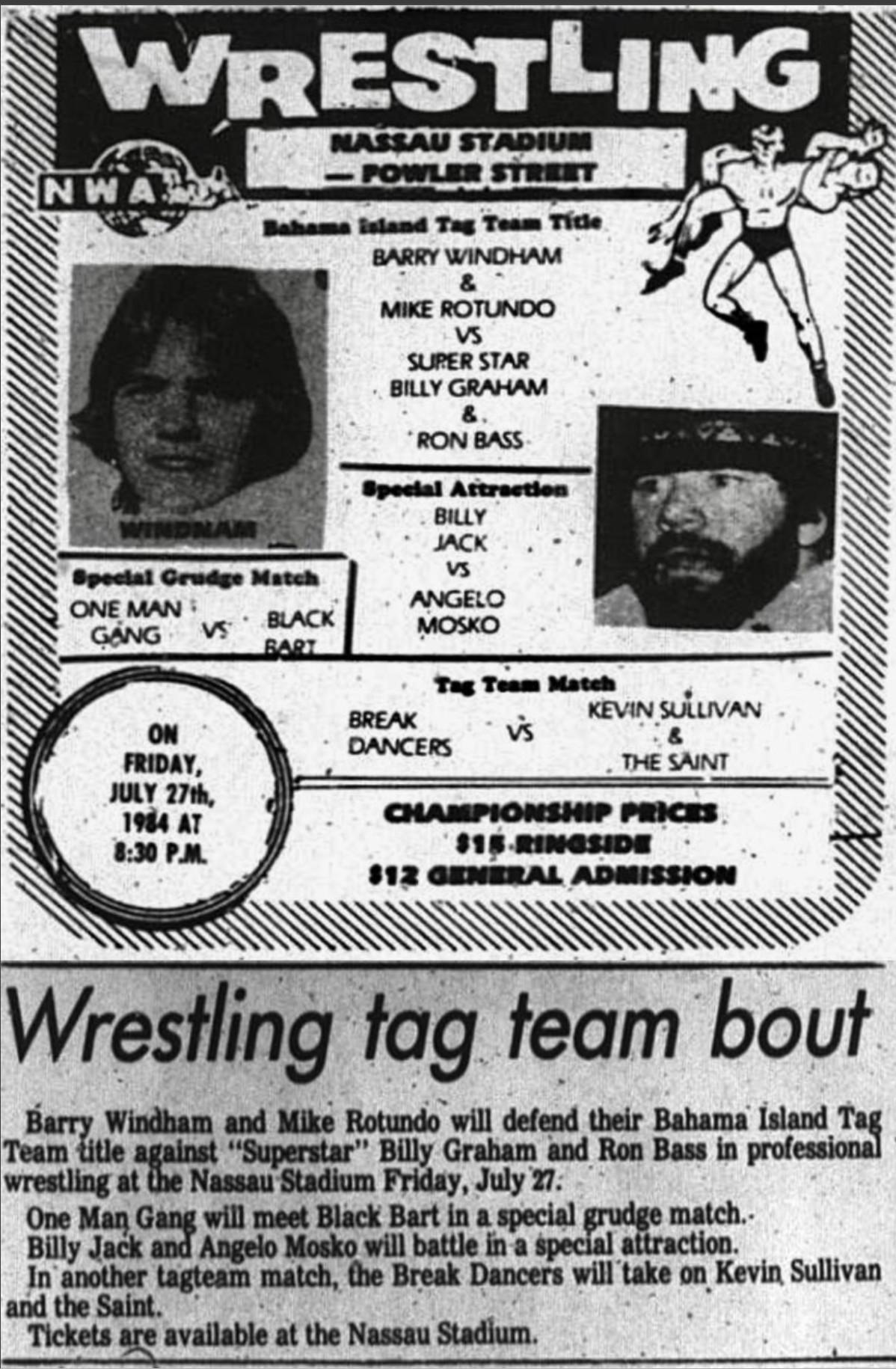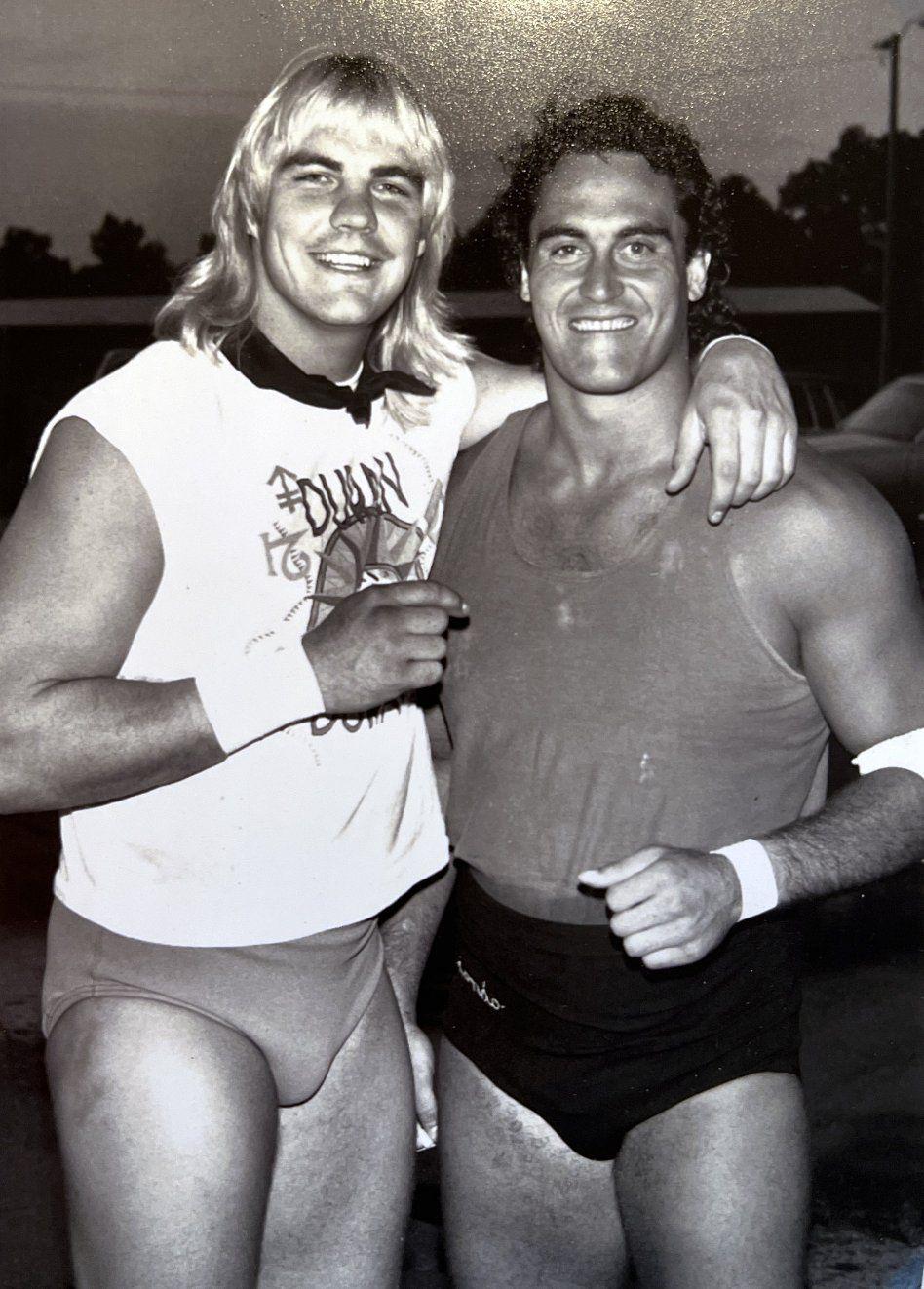Mike Rotunda and Barry Windham, who carried tag team gold into the inaugural WrestleMania as the U.S. Express, will be inducted into the WWE Hall of Fame class of 2024 on April 5, the company confirmed to The Ringer. Rotunda and Windham had numerous successes both individually and as tag team performers outside of their short, impactful tenure as the U.S. Express—indeed, Windham is already in the WWE Hall of Fame as part of the iconic Four Horsemen stable—but it was as a young, dynamic duo that the pair first tasted national stardom.
The 2024 WWE Hall of Fame ceremony will stream live on Peacock directly after SmackDown.
The U.S. Express’s journey through the world of professional wrestling is a story of athletic talent, brotherhood, and an indomitable spirit that helped to define one of the most colorful eras in WWE history. Rotunda and Windham’s ascent to the pinnacle of tag team wrestling was marked by memorable rivalries, iconic moments, and a family bond that transcended the boundaries of the ring.
Before their pairing, both men were well positioned for grappling glory. Rotunda was a dominant high school athlete in New York who played football and then wrestled at Syracuse University, winning the heavyweight championship in the Eastern Intercollegiate Wrestling Association in 1981. Windham, the tall, athletic son of 6-foot-7, 330-pound WWE Hall of Famer Blackjack Mulligan, had been training with his father since high school and possessed all the tools needed to seize the NWA Worlds Heavyweight Championship.

The seeds of the patriotic partnership were ironically sown inside a dressing room in Toronto in early 1982. There, the young Rotunda was first introduced to Windham, who was sporting a thick black mustache like his father’s.
Not long thereafter, when Dusty Rhodes—then booking the NWA Florida territory for Eddie Graham—called Carolinas promoter Jim Crockett and asked for a good-guy wrestler, Rotunda was sent his way. Rhodes looked at him and the towering Windham (who was already wrestling in the Florida territory) and decided to pair them up. “We worked seven days a week in a lot of 25- to 30-minute matches. ... It’s kind of weird because sometimes you’re put together with someone in a tag team, and you figure out quickly if it’s going to work or not. Barry and I came up with some double-team moves that we could do and got our act down right away,” Rotunda told The Ringer.

This intense regimen wasn’t just about honing their physical abilities, but also about developing an unspoken language between them in bouts across Florida and the Bahamas. This period saw them capture the hearts of fans as well as the NWA United States Tag Team Championship. They engaged in memorable feuds with teams like the Long Riders (Bill and Scott Irwin) and also claimed the Bahama Island Tag Team Championship. It was during their time in Florida when Rotunda also developed a connection with Windham’s sister, Stephanie, that would lead to marriage and, eventually, a happy family that came to include a pair of third-generation wrestling stars—Taylor (Bo Dallas) and the late Windham Rotunda (Bray Wyatt).

Their journey was not without its trials, particularly as they transitioned to the national spotlight of the WWF. Booker George Scott invited them to devise a colorful gimmick—this was when the company’s roster, top to bottom, used gimmicks to appeal to a younger audience—and Rotunda and Windham turned to the radio for inspiration. “Bruce Springsteen’s ‘Born in the U.S.A.’ was on the radio every day,” Rotunda said. “I think we might have been in the car, and I just heard that song and something related to the U.S. just popped into my head. I just said, ‘the U.S. Express.’ I ran it by Barry, and he loved it, and then we ran it by the office, and they loved it, too. And then we used ‘Born in the U.S.A.’ as our entrance song to go to the ring.”
The shift to WWF entailed a change in audience size and an adjustment to a lifestyle that was both exhilarating (increased pay) and exhausting (an increased travel schedule). “[It] was definitely a huge pay raise. But you were on the road all the time, too. You had more expenses, and it was a pretty grueling schedule,” Rotunda explained. Yet, despite these challenges, the U.S. Express didn’t just survive; they thrived, symbolizing youthful American valor and vigor during the patriotic fervor of the Rock ‘n’ Wrestling era, which coincided with Ronald Reagan’s similarly flag-draped presidency. “When Barry and I went [to WWF], we were some of the youngest guys there. It was a totally different look because we were doing a lot of double dropkicks and doing a lot of flying around compared to what some of the older wrestlers were doing at the time. New York had been more of a walk-and-talk territory of older guys who didn’t have to move around as much. Barry and I came in wrestling the exact same sort of matches we had been doing in Florida. We were constantly moving. We didn’t want to just sit in a headlock for 10 minutes.”
The legacy of the U.S. Express is not confined to their championship wins or memorable feuds but is also rooted in their influence on the tag team genre. They demonstrated the power of synergy and storytelling, elements that have become foundational to contemporary wrestling. They were, in fact, the inspiration behind Rick Derringer’s “Real American,” a song that would later become synonymous with Hulk Hogan. “‘Real American’ is good,” agreed Rotunda. “But I liked ‘Born in the U.S.A.’ just as much because it was over. That’s what people identified us with. So we used that the majority of time. … The crowds always popped when that song hit and we walked out to the ring.”
As a result of their hard work and dedication, the 20-something Rotunda and Windham captured the first WWF World Tag Team Titles on January 21, 1985, by defeating the formidable tough-guy duo of Adrian Adonis and Dick Murdoch, the “North-South Connection.” But they had even bigger rivals ahead of them.

Given their gimmick, their rivalry with the Iron Sheik and Nikolai Volkoff, which boiled over at the first WrestleMania, stands out as a highlight of their WWF tenure, encapsulating the patriotic fervor of the time. These matches were not only a showcase of their technical skills but also a narrative battleground where the values they represented were pitted against those of their adversaries. Rotunda’s recounting of these encounters emphasizes the natural chemistry and seamless in-ring communication that defined their teamwork. “The work was so easy because [Sheik and Volkoff] had so much heat. … It was challenging at the same time because they would sometimes forget stuff, and that’s when Barry would be screaming at them from the ring apron.”
Indeed, the U.S. Express cemented their place in the wrestling firmament with their involvement in the first WrestleMania, where they entered as tag team champions only to drop the belts to Sheik and Volkoff due to some cane-related chicanery. Though this seminal event would become a cornerstone of WWE’s annual calendar, its success—at least at the time—was anything but certain. Reflecting on this moment, Rotunda conveyed a sense of pride. “It’s pretty nostalgic and cool. … It was something totally brand-new to be on pay-per-view, and they had all these celebrities come in. Mr. T, Cyndi Lauper, Muhammad Ali, Liberace, and Dick Clark. I remember Jack Lanza, who was one of the agents [and the longtime tag team partner of Windham’s father], standing there saying, ‘This thing is gonna be like the Super Bowl. Just watch.’ He was right.”
Despite losing the titles at WrestleMania I, the U.S. Express’s resilience—and popularity with the fans—led to a second reign as champions after they once again proved their dominance in the tag team division in Poughkeepsie, New York, on June 17, 1985. This second reign underscored their ability to rebound and adapt, hallmarks of their storied careers.
Their final loss of the tag team title came at the hands of the Dream Team, Greg “The Hammer” Valentine and Brutus “The Barber” Beefcake, on August 24, 1985. This defeat was not just the end of their second official reign but also the beginning of the end for the U.S. Express as major players in the WWF. The loss, which involved a nefarious attack with a lit cigar by manager Johnny Valiant, exemplified the dramatic storytelling and villainy that were staples of that era’s wrestling narratives.
It also began a tumultuous chain of events for the U.S. Express; ultimately, both members left the WWF by 1987. Windham and Rotunda re-formed their tag team for a tour of All Japan Pro Wrestling in 1986, and they went undefeated against the top stars of AJPW. Upon returning home, the brother-in-law tag team reunited for one high-profile match, a one-time-only dream encounter against the Fabulous Ones—Steve Keirn and Stan Lane—at the American Wrestling Association’s WrestleRock ’86. After emerging victorious in that bout, Windham and Rotunda retired their tag team partnership from the spotlight.
Rotunda returned to the WWF later in 1986, forming a new version of the U.S. Express with “Golden Boy” Danny Spivey. Entering the ring to “Stars and Stripes Forever,” the pair was substantially less successful than the original U.S. Express. Rotunda left the WWF early in 1987 and returned to the NWA promotion in Florida just in time for the birth of his son Windham.
Rotunda would eventually join the reorganized NWA, then headquartered in Charlotte and operating as a truly national entity managed by Jim Crockett Promotions. From there, Rotunda evolved into a letterman jacket–wearing Varsity Club member alongside Rick Steiner, “Dr. Death” Steve Williams, Kevin Sullivan, and for a brief time, Spivey. Rotunda’s later transformations into boat-owning “Captain” Mike Rotunda and Michael Wallstreet in WCW and then into IRS (Irwin R. Schyster) in a return to the WWF showcased his versatility and deep understanding of the industry’s performative nature. IRS, often wielding a briefcase and spouting tax code violations at opponents and audiences alike, became a staple of early ’90s programming, demonstrating Rotunda’s ability to adapt and thrive in changing wrestling landscapes.
Fans of wrestling trivia will enjoy the fact that Rotunda was involved in the tag team partnerships that ended the two most famous world championship reigns of the legendary Road Warriors, Hawk and Animal. The Varsity Club ended the Road Warriors’ reign with the NWA World Tag Team Championship in 1989, and Money Inc. ended Hawk and Animal’s run with the WWF World Tag Team Championship in 1992.
Windham’s post–tag team career was marked by a series of reinventions and championship pursuits that solidified his legacy as a versatile competitor who finally claimed the NWA Worlds Heavyweight Championship for six months in 1993. His time with the Four Horsemen in WCW is notable, as he contended with many of that company’s early-’90s rising stars. Windham’s ability to seamlessly transition between roles, whether as a tag team specialist or as a solo competitor vying for major titles, underscored his in-depth knowledge of the sport and his natural charisma. Though brief and under varying gimmicks, his subsequent returns to WWE and WCW in the late ’90s reminded older fans of his enduring legacy and the timeless appeal of his early-career work.
The closest thing to an actual in-ring reunion of the original U.S. Express would take place in Japan a full 20 years after Rhodes first put their team together. Not only would the U.S. Express compete in a handful of matches for the International Wrestling Alliance of Japan, but Windham would be right by Rotunda’s side during the latter’s official retirement bout, when the pair took one final walk to the ring with “Real American” blaring over the loudspeakers of Korakuen Hall.
We shouldn’t overlook how appropriate Windham Rotunda’s name was: He carried on the legacies of two of the only four men to carry gold into the first WrestleMania. As Husky Harris, Bray Wyatt, and the Fiend, Windham Rotunda demonstrated the same unique ability to adapt to creative character changes and thrive in the aftermath. Windham’s reigns with the WWE Championship and WWE Universal Championship were the byproduct of a family upbringing that predicted great success. In retrospect, it seems that even the day of his birth was no accident; he was born early in the morning of May 23, 1987, in the immediate aftermath of his father’s world title match against “Nature Boy” Ric Flair in Jacksonville.
Rotunda captured the essence of his conjoined legacy with Barry Windham: “Barry and I get along great. He lives a couple of streets over from us [in Brooksville, Florida], so I get to see him quite a bit. We’ll go fishing together every once in a while, and hang out all the time. I guess you could say his sister, Stephanie, didn’t steal his best friend from him after all.”
The two transcended the competitive spirit of wrestling to forge a lifelong bond. However, after the death of Windham Rotunda last year, even a joyful occasion like the Hall of Fame induction has a cloud hanging over it. Rotunda said, “It’s an honor to be chosen for induction into the WWE Hall of Fame. Not everyone gets to go in. Of course, it would have been a far nicer experience if Windham had been here to see it along with my other kids and my grandkids.”
Ian Douglass is a journalist and historian who is originally from Southfield, Michigan. He is the coauthor of several pro wrestling autobiographies, and is the author of Bahamian Rhapsody, a book about the history of professional wrestling in the Bahamas, which is available on Amazon. You can follow him on Twitter (@Streamglass) and read more of his work at iandouglass.net.
Oliver Lee Bateman is a journalist and sports historian who lives in Pittsburgh. You can follow him on Twitter (@MoustacheClubUS) and read more of his work at oliverbateman.com.